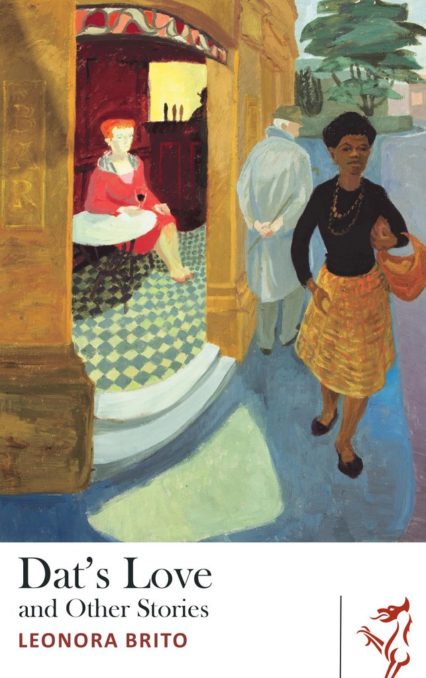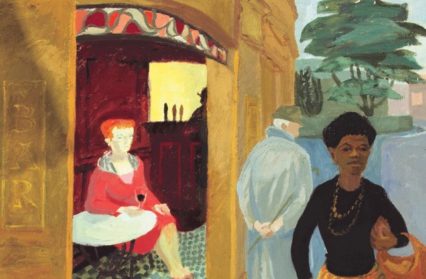Mustafa Hameed reviews Leonora Brito’s Dat’s Love, a collection of short stories exploring race, identity and love.
Leonora Brito was born in what was known then as Tiger Bay, Cardiff. Her mother and grandmother were from Cardiff, while her mother’s father and her own father were seamen from Cape Verde Islands. It is evident by many of Brito’s stories, such as ‘Digging for Victory’, that Tiger Bay, which Brito referred to as a ‘village’, had a great creative influence on her. Stories such as ‘Dat’s Love’ depict the experiences of a working-class black woman, while others like ‘Dido Elizabeth Belle – A Narrative Of Her Life (extant)’ challenge colonial history, subverting racial stereotypes and the importance of reclaiming and telling your own stories (akin to the idea of ‘own voices’).
 In Dat’s Love, Brito charms us into the lives of her unique characters. In the title story, Grace, ‘a godly singer’, and a former cigar-roller in a factory, is called upon to sing at the funeral service of the famous singer, Dooley Wilson. This is the same Dooley Wilson responsible for romantically wounding Grace years ago, causing her to fall out with her uncouth and loud friend, Sarah Vaughan, (who goes on to become the Sarah Vaughan). Grace’s memories of Dooley and Vaughan are bridled with romantic tensions, singing rivalry and betrayal, as she is left to contemplate the nature of love in a moment of death. The funeral itself is congregated by figures from Grace’s past, the people and the memories attached to them, vulnerably undoing her youthful naivety and romanticism. ‘I think we travel in flocks; different flocks, cut into by our shadowy opposites always flying the other way. And not just for love, but for life’, Grace tells us before her voice is called upon by the church organ to sing over the body of Dooley Wilson as she holds her tears back like a ‘jewel thief’.
In Dat’s Love, Brito charms us into the lives of her unique characters. In the title story, Grace, ‘a godly singer’, and a former cigar-roller in a factory, is called upon to sing at the funeral service of the famous singer, Dooley Wilson. This is the same Dooley Wilson responsible for romantically wounding Grace years ago, causing her to fall out with her uncouth and loud friend, Sarah Vaughan, (who goes on to become the Sarah Vaughan). Grace’s memories of Dooley and Vaughan are bridled with romantic tensions, singing rivalry and betrayal, as she is left to contemplate the nature of love in a moment of death. The funeral itself is congregated by figures from Grace’s past, the people and the memories attached to them, vulnerably undoing her youthful naivety and romanticism. ‘I think we travel in flocks; different flocks, cut into by our shadowy opposites always flying the other way. And not just for love, but for life’, Grace tells us before her voice is called upon by the church organ to sing over the body of Dooley Wilson as she holds her tears back like a ‘jewel thief’.
Like many of Brito’s central characters, Grace’s dry humour, wit and acute observations of the people around her stand apart. It is as though they are looking at life from a slightly distanced angle from the rest. Bold explorations of race and identity are also prominent throughout Brito’s stories. Sarah Vaughan becomes the ‘coloured young lady with the Welsh name’ once she joins Dooley’s dance-troupe and becomes a star in London. Brito portrays the non-linear ways in which identity is constructed and is externally forced onto people of colour – how this becomes an almost performance of identity in Sarah Vaughan’s case.
Stories such as ‘Michael Myers Has Teeth Like a Broken Down Picket-Fence’ resonate in the way that they situate the everyday lives of the working class in the wider context of the world. Young Lesley-Ann and her family’s TV viewing schedule is interrupted by two newsflashes announcing the attempted assassination and subsequent murder of President Kennedy. Thus, a casual and warm family night before the magical glow of the TV-set prefigures the precedent of world events crashing into the domestic realm and into the curious and impressionable mind of the young Lesley-Ann in Cardiff.
In ‘In Very Pleasant Surroundings’ we meet Barbara, an energetic, gregarious, middle-aged black woman who is diagnosed with cancer. Before her friends and family, Barbara feigns optimism and good humour as she hooks her arm into the air vowing to take her first session of chemotherapy ‘like a man!’ What follows after Barbara is left alone in hospital, overlooking the sea without the usual support of her family, friends and their babble of tongues, is a beautifully crafted piece of prose by Brito teaching us about the personal sense of vulnerability, loneliness and fear that naturally accompanies sickness and death.
Meanwhile, ‘Mother Country’, Brito’s other story set in a hospital, follows a young African woman’s confusion after giving birth to a blue-eyed ‘doll’ with ‘small white fingers’. The story deals with the psychological trauma brought about by the harmful internalisation of racist discourses. The mother suffers from a post-natal disassociation and debilitating mental health as she contemplates the fragility of the newborn baby in an unaccepting world. The trauma reaches a disturbing climax when she entertains dark thoughts of how she could take her newborn ‘by the legs, the ankles perhaps, and dash its brains out’.
There is an important need to redress histories in Brito’s writing. In the powerful ‘Dido Elizabeth Belle’, a young black woman seeks to rectify the origins of her real identity. Having been betrayed by her uncle on an account of her history, in which she had no say, Dido wishes ‘to possess [history], rather than be possessed by it’. Running away from her uncle’s estate and stumbling into the wilderness, Dido outwits and outsmarts the gaze of her new, dull, white protector who stereotypically perceives her to be an escaped slave, a ‘negro-girl’, addressing her in a patronising manner. He finds her to be an anomalous intrigue due to her fine ‘draggins of silk and satin’ and ‘scholard’ way of speaking. Dido comes to embody the repressed truths and fabricated lies of Empire whose very identity is itself at stake should it be known that Dido’s biological father is none other than her white slave master – Sir John Lindsay. Through the story, Brito makes a crucial point about how Black people’s history is negatively re-imagined in order to serve the insatiable gaze and appetite of the Occident and its need for an exoticised Other. Dido’s flight from her uncle is a form of protest and a powerful attempt at reconstructing herself, Her–story anew.
To learn that Brito was a student of Fine Art in her youth comes as little surprise after reading Dat’s Love. Through her words, Brito’s short stories illustrate a literary sense that soaks up the sights, sounds and colours of her surroundings. Descriptions of the sinking evening are given as “royal blue behind the glass, with just a few sodium lights, orange in the distance”. This pictorial ability permeates Brito’s stories, showcasing her mastery of vibrant metaphors and arresting similes. With each story, Brito word-paints the world she wishes the reader to participate in from her simple descriptions of ‘small coal glowed dull red in the fire basket like a heap of cola cubes dusted with sugar, which was the ash’ to her description of a singing voice that was ‘all honey and molasses’. Tiger Bay and its modest black Caribbean inhabitants are poetically elevated through her finely tuned character constructions; characters whose voices continue to linger in the reader’s mind long after we have left Brito’s mythologised Cardiff.
In the more light-hearted ‘Digging for Victory’, narrated by a suggestible black female clerk, Churchill sails into the docks of Cardiff in a warship only for it to crash into the inner gates of the sea lock at night, causing the canal waters to flood into the sea. With his post-war honed oratory skills, Churchill then calls on the local residents to repair the damage in the name of national service. Justifying her patriotism the young clerk reminds the reader that it is merely an extension of service offered by the colonised peoples of the Empire during wartime who had rushed to Britain’s aid otherwise Britain would have gone it alone. ‘Jamaica,’ she reminds us, ‘was the first with the spitfire fund’.
Many writers have attested to the difficulty of achieving mastery over the short story form, which has seen a revival in the last few decades. Brito’s ability to compact so many characters, worlds and emotions into her stories is a gratifying literary ritual to partake in as a reader. The author Neil Gaiman described short stories as ‘tiny windows into other worlds and other minds and other dreams’ and a form that allows the reader to make journeys ‘to the far side of the universe and still be back in time for dinner’. Brito certainly accomplishes this feat.
Dat’s Love creates an enduring impression of a contemporary Welsh literary giant in-the-making. Through her extant body of short stories, we can only begin to acknowledge the loss of a prodigious literary artist with a breathtaking imagination who was only just warming up. Her depictions of the bustling and multicultural Tiger Bay and Cardiff, and its inhabitants – especially the African diaspora community – are invaluable. Each reading of the collection reveals something new and continues to leave the reader stunned at the nimble skill of Brito’s writing – that deservedly won her the Rhys Davies Short Story Award in 1991. The themes of race, community, a sense of place, history and identity (and specifically a Welsh identity) explored in Brito’s writing are timeless and relevant as ever, making Dat’s Love a must-read for everyone.
Dat’s Love and Other Stories is now available from Parthian Books.












